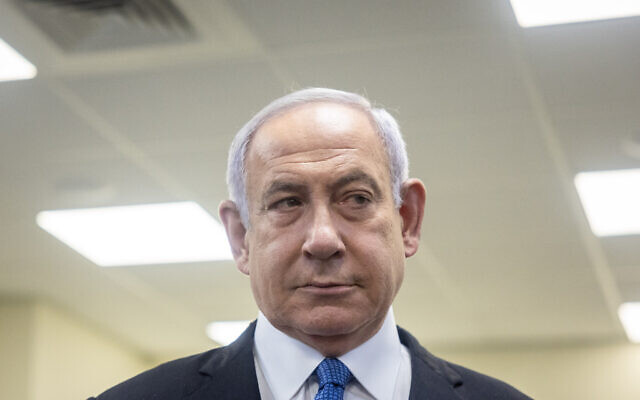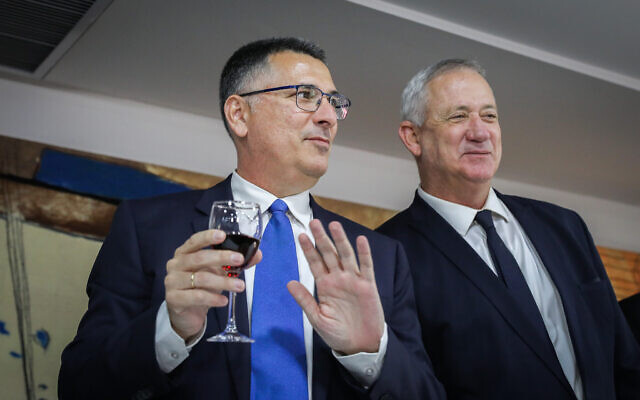With exactly 100 days left until Israel’s November 1 election, two rival groupings are competing for soft-right votes by focusing on hot-button issues including democratic erosion and the influence of Arab politicians on the coalition.
Likud and its two-decade-strong leader, Benjamin Netanyahu, are trying to return Israel’s largest party and its right-religious allies to power by arguing that no other alternative can form a coalition, especially without Arab parties.
Meanwhile, the messaging of the combined “Blue and White The New Hope” party — created after Defense Minister Benny Gantz and Justice Minister Gideon Sa’ar joined forces — is to remind voters why Netanyahu must be prevented from retaking power, creating a highlight reel of Likud lawmakers’ anti-democratic statements.
Without fundamental shifts in the political map, the upcoming election is likely to hinge on just a few mandates, or even end up in yet another political stalemate, where neither the coalition-allied bloc nor the right-religious opposition will be able to reach 61 seats to form a government, which would trigger yet another election.
Historically, the majority Arab Joint List party ideologically refrains from joining Israeli governments, and many Zionist parties would find partnership with the Joint List problematic regardless – removing a swath of votes from coalition contention.
The election is expected to be determined by Arab and soft-right votes, two key groups who hold the potential to reshape the power blocs. Arab voter turnout is expected to be down, potentially shrinking one piece of the election pie.

Opposition leader former prime minister Benjamin Netanyahu arrives to testify before the Meron Disaster Inquiry Committee, in Jerusalem, on July 21, 2022. (Yonatan Sindel/Flash90)
One of the homes for traditionally soft-right votes, Yamina, is currently polling under the electoral threshold, after a raucous year in which it compromised on core platform promises to join — and lead — the coalition.
The soft-right — who found homes in the last election among the coalition’s Yamina, Blue and White, and New Hope — are an ill-defined but now much-courted class of voters. In general, these voters hold right-wing values and are either secular or liberally religious, but were upset by the coalition’s at-times capitulation to the Islamist Ra’am party. Many such voters have also been conflicted about Netanyahu, who is both a polarizing figure and facing trial in three corruption cases.
Likud, which specializes in its unique brand of narrative simplicity, suggested in a campaign ad released Sunday that its rivals cannot form a government without Arab party support.
“If you vote for [Yesh Atid leader Yair] Lapid, or Gantz, or Lapid-Gantz, in the end, you’re voting for [Ra’am leader] Mansour Abbas,” the voiceover reads, set to carnival music.
Hitting the point home, the ad argued that without Ra’am, neither the current prime minister nor the current defense minister would have the numbers to form a government.
“Lapid and Gantz don’t have a government without the Muslim Brotherhood,” the voiceover claims, repeating an oft-employed motif connecting Ra’am and its umbrella organization, the Southern Branch of Islamic Movement, to ideological roots tied to the Muslim Brotherhood.
Likud is only correct, however, if it succeeds in courting soft-right votes to its camp. If a significant number of these voters remain with the so-called “change bloc” supported by the government, the bloc can produce a government without relying upon Ra’am.
Israel’s notoriously unreliable but politically influential polls place the change bloc right under 60 seats, with Yamina not hitting the threshold to enter the Knesset. If the bloc can succeed in courting Yamina’s seats its way, it may hit 61 by November.
The combined Gantz-Sa’ar faction, meanwhile, makes its case by presenting the anti-democratic boogeyman posed by the Likud. In a clip laden with Likud lawmakers’ statements about stopping Netanyahu’s ongoing trial, breaking left-wing politicians’ bones, and politicizing the attorney general, the new joint slate argues that voters “can’t let” Netanyahu “return.”

Gideon Sa’ar (left) and Benny Gantz at a justice minister ceremony, June 14, 2021. (Olivier Fitoussi/Flash90/File)
Independent campaign strategist Moshe Klughaft — a controversial political operative who has worked with a number of Israeli political parties — suggested Sunday that strong statements made during campaigning could potentially be turned against Likud by its opponents in the future.
Ultimately, neither bloc’s messaging to date has painted a vision for voters of what they would do once in power, instead defining their value proposition as preventing the other camp from holding power.
By contrast, the Labor party took an alternate tack in the ad it released Sunday, promising to “actually work on behalf of citizens.” Its leader Merav Michaeli has a different immediate goal: expanding the party’s influence among the center-left, not competing for the premiership.
Lapid’s Yesh Atid party has yet to release a major campaign video, but the prime minister has tried to distance himself from the narrative that he could only form a government with the Joint List by delivering ambiguous statements about not partnering with “extremists.”
"soft" - Google News
July 25, 2022 at 02:07AM
https://ift.tt/QWcfa7u
100 days out from election, campaign ads battle for soft-right voters - The Times of Israel
"soft" - Google News
https://ift.tt/127wGLQ
https://ift.tt/OLJ96Hh
Bagikan Berita Ini














0 Response to "100 days out from election, campaign ads battle for soft-right voters - The Times of Israel"
Post a Comment